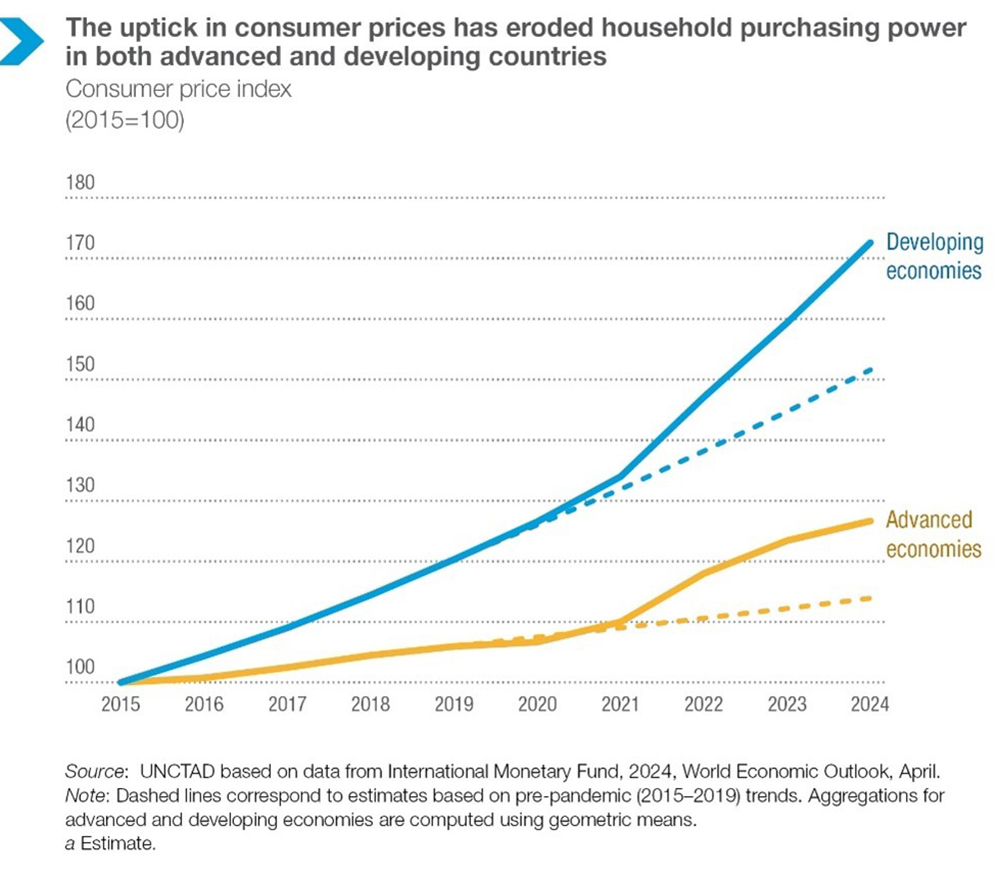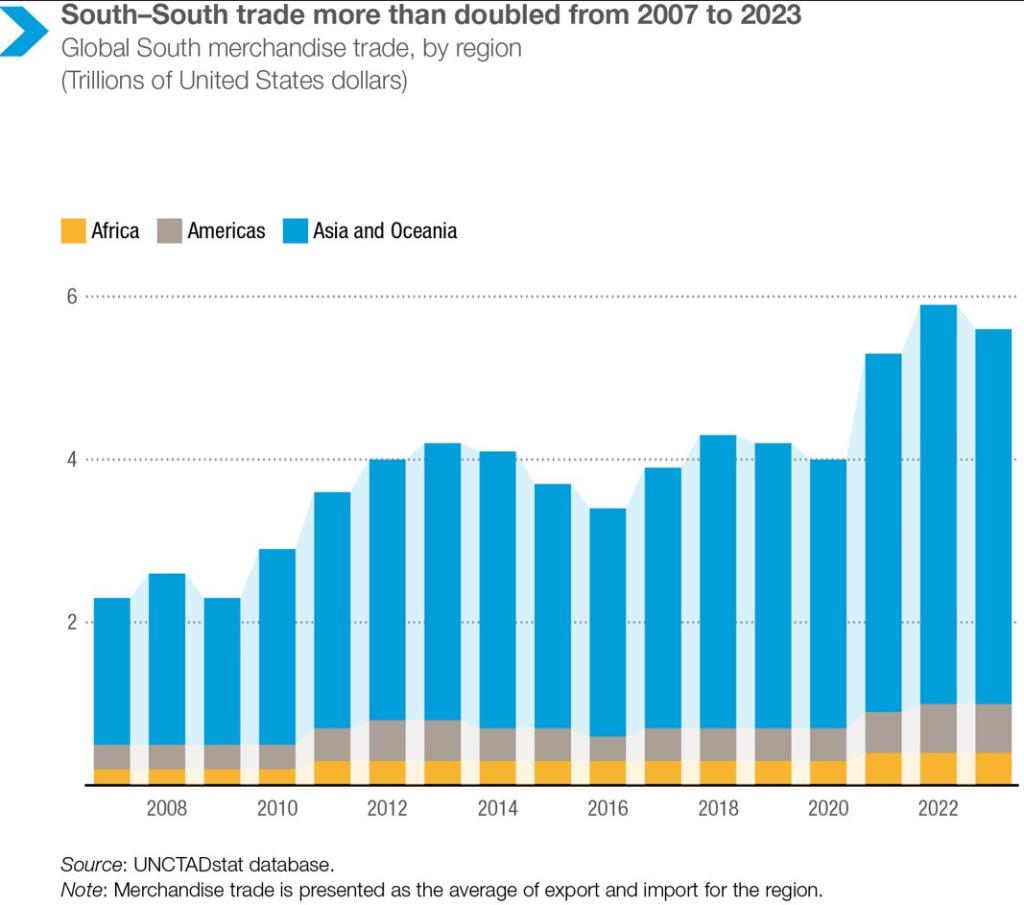UN Trade and Development (UNCTAD) today released its Trade and Development Report 2024: Rethinking Development in the Age of Discontent, urging a fundamental rethinking of global development strategies as low growth, high debt, and weak investment and trade deepen the divide between industrialized and developing nations.
The report highlights that despite opportunities for developing countries due to growth in South-South trade and demand created by minerals driving the green transition, developing countries face mounting challenges in navigating a sluggish global economy. Multilateral action and revised international financial architecture are essential for addressing these challenges and supporting sustainable, inclusive growth.
Read the overview: Rethinking development in the age of discontent
Global Growth: The new "low normal"
UNCTAD's report underscores the emergence of a "low normal" in global economic growth, with rates projected to remain at just 2.7% for 2024 and 2025, down from an annual average of 3.0% between 2001 and 2019. This is a stark contrast to the 4.4% average growth seen in the years leading up to the global financial crisis.
For developing economies, this slowdown is more acute. While they grew at an impressive 6.6% during 2003-2013, their average growth has since fallen to just 4.1% between 2014 and 2024. Excluding China, the picture is even bleaker: growth in the Global South has averaged only 2.8% over the last decade. At the same time, developing countries have seen their debt burdens swell by 70% between 2010 and 2023, putting many at risk of austerity measures that could undermine progress toward inclusive development.
Inflation and discontent
The report highlights how post-pandemic inflation, driven by supply chain disruptions and concentrated market power in key sectors, such as agriculture and energy, has eroded purchasing power in developing countries. Household incomes have dropped by 8% since 2020 due to inflation, resulting in widespread social discontent across the world.
UNCTAD warns against relying solely on monetary tightening to address inflation, calling instead for a policy mix that includes fiscal and regulatory strategies. "Inflation has hit developing economies hardest, and has eroded households' incomes, reducing their purchasing power. This has fed into social discontent. Now the solution requires coordinated action to stabilize prices, expand fiscal space, curb anti-competitive practices, and promote inclusive growth".

The changing structure of global trade and potential of South-South trade
Despite the challenges, UNCTAD points to growing South-South trade and the green transition as key opportunities for developing countries. South-South trade-trade between developing countries-has more than doubled between 2007 and 2023, from $2.3 trillion in 2007 to $5.6 trillion in 2023, offering developing countries a chance to reduce dependence on traditional trade partners and strengthen regional economic integration.
By leveraging regional trade and integration agreements, such as the Africa Continental Free Trade Agreement and ASEAN Economic Community, and implementing strategic industrial policies, developing countries can better navigate the risks of fragmented trade and build more resilient economies.
The green transition also presents new avenues for growth, especially through increased demand for critical minerals and raw materials which are mostly in Africa and Latin America and are essential to drive the transition to electric vehicles, renewable energy and the digital economy.

The report highlights significant changes in the structure of global trade. While goods still account for over 75% of total trade, services trade has grown rapidly, expanding by 5% in real terms since 2023. Services now make up 25% of gross global trade flows, offering new growth potential for developing countries.
However, despite this growth, developing nations still represent less than 30% of world services export revenues, highlighting the persistent North-South divide. In the fast-growing creative services sector, valued at $1.4 trillion in 2022, developed countries dominate, accounting for 80% of exports, despite representing less than 60% of the global economy.
Financialization and commodity market volatility
UNCTAD also warns of the risks posed by the financialization of global commodity markets. Commodity-dependent economies face heightened vulnerability as prices remain 20% above pre-pandemic levels, exacerbating the effects of external shocks. UNCTAD emphasizes the need for diversification strategies and tax policies in these economies to ensure resilience and sources of long-term finance.
A call to rethink economic development
UNCTAD concludes that developing countries face tough policy trade-offs due to overlapping crises, including high energy prices, rising demand for health and social services, and increasing protectionism. The Trade and Development Report 2024 urges countries to pursue new development pathways focused on economic diversification, resilience and inclusive growth, moving away from only traditional manufacturing-led export models.
"Industrial policy is back, alongside the need for robust state capacity to guide and coordinate these efforts," noted UN Trade and Development Secretary-General Rebeca Grynspan. "We must rethink, reform and revive. Rethink global development strategies, reform the international financial system, and revive the commitment to multilateralism to provide real support for developing countries. They have the opportunity of South-South trade and the green transition, and the challenges of slow global growth, financial instability, high debt, and accelerated changes in global trade."
UNCTAD stresses the need to rethink macroeconomic and development policy, stressing the urgency of global governance reforms across the global debt, financial and trade architecture.
Multilateral action and a shift toward development-focused global finance are essential for helping countries navigate the risks and opportunities of a new growth era to achieve sustainable development to address discontent.






